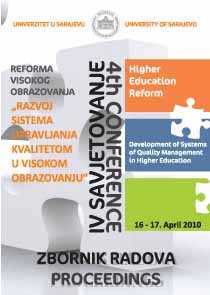Strateško planiranje i evaluacija visokoškolskih ustanova
Strategic Planning and Evaluation of Higher Education Institutions
Author(s): Sait KačaporSubject(s): Social Sciences
Published by: Univerzitet u Sarajevu
Keywords: strategic planning; development of a plan; development of activities plan; curriculum; long-term planning; short-term planning; monitoring; evaluation
Summary/Abstract: In this paper, strategic planning refers to the development of instruments, serving to determine the vision of development of a higher education institution, that is, instruments which will help every member of the organization to clearly define individual tasks and obligations leading to the same goal. Strategic planning is understood as a system in which results/goals are set, that is, in which tasks which lead to achievement of a goal are clearly defined, provided that the strategies/methods have been selected. Several segments of planning are differed: / strategic / development of priorities and tasks which will be realized in the course of several years “the macro plan”, / operative/ “annual plan”, / monthly, weekly and daily/ “micro plan”. The second important notion is evaluation, which implies assessment of the merits in the activities of a higher education institution, in accordance to the previously-determined criteria, that is, standards. The following elements are included in that process: Systematic, non-experimental monitoring of work and activities of a higher education institution, for the purpose of observing, prevention and lowering the impact of all the disruptive elements in the process of reaching the goal set; that is, observing all the valuable elements which should be later favored and improved; Measuring the results achieved in all phases of work of a higher education institution and Evaluation of all components of educational process through the application of quantitative and qualitative methods of analysis of that process. The overall goal of the evaluation process is the improvement of work of a higher education institution. That process means evaluation of teachers, associate experts and teaching assistants, i.e., evaluation of their success. The work of teaching staff and of other participants in the teaching process is evaluated through a prism of conditions that are to be formed in order to achieve their more creative teaching approach, which means joint evaluation, as well as self-evaluation and self-monitoring. Certainly, this process also implies student evaluation through new, “efficient” forms of monitoring of student work in the period prior to examinations, as well as evaluation during the exams. This also implies the evaluation of all other participants in the work of a higher education institution, including the technical and other personnel, administration, library, etc. Quality and quality management is the next important notion. That is a permanent process of implementation of the new realizations, which implies permanent, lifelong education of participants in the work of a higher education institution. Quality management means adjustment of the higher institutions’ activities with the accepted standards, that is, implementation of the standards aimed to enable mobility of ECTS grades or international accreditation which is seen in readable and comparable degrees.
Journal: Zbornik radova - Univerzitet u Sarajevu
- Issue Year: 2010
- Issue No: 04
- Page Range: 217-234
- Page Count: 18
- Language: Bosnian

